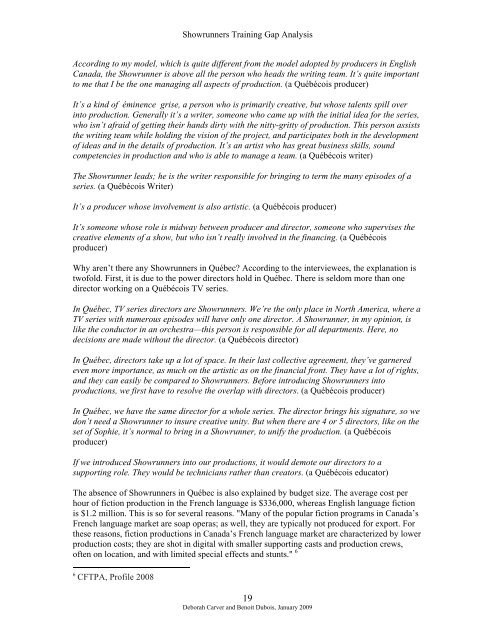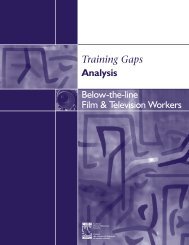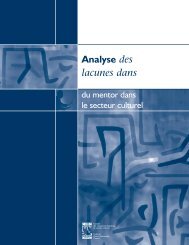Showrunners - Training Gaps Analysis - Cultural Human Resources ...
Showrunners - Training Gaps Analysis - Cultural Human Resources ...
Showrunners - Training Gaps Analysis - Cultural Human Resources ...
You also want an ePaper? Increase the reach of your titles
YUMPU automatically turns print PDFs into web optimized ePapers that Google loves.
<strong>Showrunners</strong> <strong>Training</strong> Gap <strong>Analysis</strong><br />
According to my model, which is quite different from the model adopted by producers in English<br />
Canada, the Showrunner is above all the person who heads the writing team. It’s quite important<br />
to me that I be the one managing all aspects of production. (a Québécois producer)<br />
It’s a kind of éminence grise, a person who is primarily creative, but whose talents spill over<br />
into production. Generally it’s a writer, someone who came up with the initial idea for the series,<br />
who isn’t afraid of getting their hands dirty with the nitty-gritty of production. This person assists<br />
the writing team while holding the vision of the project, and participates both in the development<br />
of ideas and in the details of production. It’s an artist who has great business skills, sound<br />
competencies in production and who is able to manage a team. (a Québécois writer)<br />
The Showrunner leads; he is the writer responsible for bringing to term the many episodes of a<br />
series. (a Québécois Writer)<br />
It’s a producer whose involvement is also artistic. (a Québécois producer)<br />
It’s someone whose role is midway between producer and director, someone who supervises the<br />
creative elements of a show, but who isn’t really involved in the financing. (a Québécois<br />
producer)<br />
Why aren’t there any <strong>Showrunners</strong> in Québec? According to the interviewees, the explanation is<br />
twofold. First, it is due to the power directors hold in Québec. There is seldom more than one<br />
director working on a Québécois TV series.<br />
In Québec, TV series directors are <strong>Showrunners</strong>. We’re the only place in North America, where a<br />
TV series with numerous episodes will have only one director. A Showrunner, in my opinion, is<br />
like the conductor in an orchestra—this person is responsible for all departments. Here, no<br />
decisions are made without the director. (a Québécois director)<br />
In Québec, directors take up a lot of space. In their last collective agreement, they’ve garnered<br />
even more importance, as much on the artistic as on the financial front. They have a lot of rights,<br />
and they can easily be compared to <strong>Showrunners</strong>. Before introducing <strong>Showrunners</strong> into<br />
productions, we first have to resolve the overlap with directors. (a Québécois producer)<br />
In Québec, we have the same director for a whole series. The director brings his signature, so we<br />
don’t need a Showrunner to insure creative unity. But when there are 4 or 5 directors, like on the<br />
set of Sophie, it’s normal to bring in a Showrunner, to unify the production. (a Québécois<br />
producer)<br />
If we introduced <strong>Showrunners</strong> into our productions, it would demote our directors to a<br />
supporting role. They would be technicians rather than creators. (a Québécois educator)<br />
The absence of <strong>Showrunners</strong> in Québec is also explained by budget size. The average cost per<br />
hour of fiction production in the French language is $336,000, whereas English language fiction<br />
is $1.2 million. This is so for several reasons. "Many of the popular fiction programs in Canada’s<br />
French language market are soap operas; as well, they are typically not produced for export. For<br />
these reasons, fiction productions in Canada’s French language market are characterized by lower<br />
production costs; they are shot in digital with smaller supporting casts and production crews,<br />
often on location, and with limited special effects and stunts." 6<br />
6 CFTPA, Profile 2008<br />
19<br />
Deborah Carver and Benoit Dubois, January 2009










